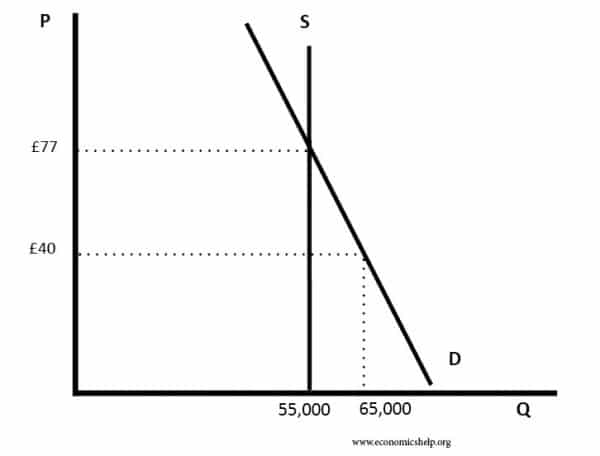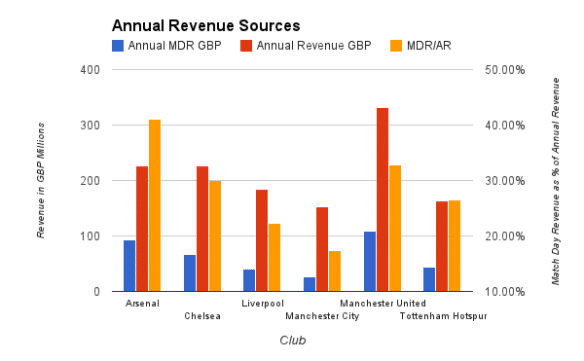Recently, Liverpool supporters protested about plans to increase the price of many ticket (the most expensive seat in the Main Stand will now be £77). Many supporters complain that football tickets have risen well above the rate of inflation in recent years, making football less accessible to supporters on lower-incomes. But, what are the economic arguments for limiting ticket prices?
The average price of the cheapest match-day ticket from the Premier League to League Two is now £21.49. Ticket prices have increased 13% since 2011, compared to a 6.8% rise in the cost of living. (BBC)
Supply and demand
From one perspective, the market clearing price for tickets, would be where supply equals demand. If there is a waiting list for tickets, if games are always sold out – then this is an indication prices are below the market equilibrium.

If the firm kept prices below the equilibrium at £40, it would make £2.2 million per game. That’s a big potential loss in revenue. With many clubs in the Premier League regularly having full stadium, it suggests many are already pricing below the equilibrium.
From a perspective of profit maximisation, it is understandable why clubs who are always full, will try to increase prices.
Evaluation – price discrimination
It should be pointed out that all football clubs practise a form of price discrimination. The price of £77 for a ticket in the main stand is only one price. There are also discounted tickets for concessionary groups, lower grade opposition, and different areas in the ground.
If we take example of Liverpool, the max proposed price is £77, but average price will be £48.
Strong price discrimination can be a way of increasing revenue, but still enabling cheaper prices for football supporters on lower incomes.
Without price discrimination, clubs limit the amount of potential revenue.
This graph shows the percentage of revenue gained from match tickets
Match day revenue: LFC Boston blog
Liverpool gain just 22% of revenue from match day revenue – compared to 42% for Arsenal.
Arguments for limiting ticket price increases for football
However, we can still make a case for keeping ticket prices below the equilibrium.
PR for a club. Match revenue from ticket sales is becoming a smaller percentage of overall revenue, due to money received from sponsorship and tv revenues. If you alienate supporters by inflation busting increases, the damage to the clubs reputation may be greater than the extra revenue from higher prices. If football supporters feel loyalty towards the club, they are more likely to purchase extras like replica shirts (also very expensive).
Social responsibility. Another argument put forward is that football was always the working-mans game, if it becomes the preserve of high earners, the football club will lose out to a wider community connection. Many in the game feel football clubs have a responsibility to make it affordable to those on low incomes, young supporters and unemployment. From an economic perspective it is the argument football clubs should not be about profit maximisation, but wider social goals of giving something back to the community.
TV revenue. From next season, every Premier League club will earn at least £100m thanks to new tv money.
Where does the money go? If all clubs in the Premier League increased ticket prices by 50% – where would the extra revenue go? It would essentially go on inflating players / managers wages and transfer prices. In 1980, the best player gained a transfer fee of £1 million (Trevor Francis). With all the money flowing into football, the best player will now gain a transfer fee of £85 million (Gareth Bale, 2013). The point is that if all clubs double their revenue, it doesn’t really change anything about the game. The main winners are the players, who gain inflated salaries. If all football clubs place a cap on ticket prices it may help to limit the revenue which can be used to bid for players (through higher wages and transfer fees).
Interestingly Arsene Wenger recently commented that all the extra tv revenue will have to be used for higher transfer fees, rather than cut ticket prices. The point is when clubs get extra money, they immediately have more to push the bidding war higher.
- The evaluation to this is that the Premier League may argue they are in competition with other leagues in Spain, China and Italy. If the Premier League cut revenue and ticket prices, they may lose out on players tempted to other leagues which have more money behind them. Still
Monopoly power. A final economic argument is that most football clubs have strong monopoly power. If you are a Liverpool FC supporter, you are not going to support Bury FC – just because ticket prices go up. This means demand is very price inelastic, and clubs can increase prices to capture consumer surplus. Given monopoly power, supporters are caught in a trap – pay the prices or don’t see the game. Monopoly power can be a reason to limit price increases and keep prices lower to make it fairer.
Conclusion – Are ticket prices too high?
In one sense it depends on what the objectives of a football club are. If the objectives are maximise revenue to enable to buy the best players and win the most trophies, higher ticket prices probably make sense. Certainly the top clubs like Manchester United, Man City and Chelsea have benefited from increasing ticket prices. If English football clubs want to keep up with other leagues, then higher prices are perhaps inevitable.
However, football prices in England are higher than many of our continental clubs, like Germany and Spain. Higher ticket prices doesn’t necessarily buy success in Europe. Also, should the aim of football clubs be profit maximisation? Many in the game argue that they have a responsibility to consider all sections of football supporters and keep prices affordable.
The final point is that TV revenue keeps growing, so match day revenue may continue to fall as a share of total income. If this is the case, reducing price of some tickets may only have a marginal impact on total revenue.


There are usually only about 0-10 first class seats for the most elite travelers. Some airlines offer no first class at all; it is not as profitable as business class because only few can effort the fare.